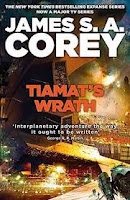It’s here, the penultimate tale in the Expanse novels, 2019’s Tiamat’s Wrath. Picking up where the wild swing of Persepolis Rising left off, the novel doubles down on the crew of the Rocinante in old age and their fight against the authoritarian Laconian government which would have the human universe conform to its rule.
Tiamat’s Wrath opens with the crew of the Rocinante still scattered. Jim remains captive on Laconia, but is in daily contact with Dr. Cortazar, passing on what he knows about the protomolecule while sowing seeds of knowledge of his own. Naomi, in an attempt to deal with Jim’s absence, has taken a passive role in the resistance, while Bobbie plays the active role plotting sabotage, and more. Not seen since Cibola Burn, Elvi Okoye returns, this time as chief science officer aboard a Laconian military ship investigating the warp gates. And newly introduced to the series is Winston Duarte’s fourteen-year old daughter, Teresa. Highly intelligent, both in IQ and EQ, she is being groomed by her autocrat father to someday be leader. Little does he know, however, the effect his tight grip on her upbringing will have.












